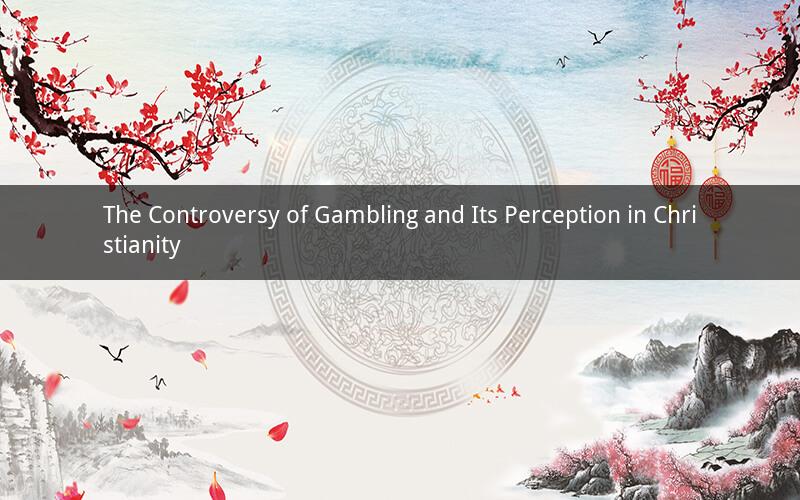
Introduction:
The debate over gambling and its compatibility with Christian beliefs has been a topic of intense discussion for centuries. Is gambling inherently anti-Christian? This article explores the various perspectives and arguments surrounding this contentious issue.
1. Understanding the Christian Perspective on Gambling:
In the Christian faith, the Bible plays a central role in guiding believers' moral decisions. Some Christians argue that gambling is prohibited in the Bible, while others believe that it can be practiced responsibly. Let's delve into the biblical arguments for and against gambling.
1.1 Arguments Against Gambling in Christianity:
1. The Ten Commandments: Many Christians believe that the tenth commandment, "You shall not covet your neighbor's goods," implies that gambling is a sin. They argue that gambling involves a desire for wealth and material possessions, which is forbidden by this commandment.
2. The Parable of the Rich Fool: Jesus Christ's teachings often emphasize the dangers of wealth and materialism. The parable of the rich fool, where a man accumulates wealth but loses his soul, is often cited as evidence against gambling.
3. The Risk of Addiction: Christians argue that gambling can lead to addiction, which is a moral and spiritual issue. They believe that it is the duty of believers to avoid activities that may lead to destructive behavior.
1.2 Arguments for Gambling in Christianity:
1. The Use of Games of Chance in the Bible: Some Christians argue that the Bible mentions games of chance, such as casting lots, which indicates that gambling is not inherently evil. They believe that the Bible does not explicitly prohibit all forms of gambling.
2. Personal Responsibility: Proponents of gambling argue that it can be a form of entertainment, as long as it is done responsibly. They emphasize the importance of personal responsibility and self-control in making decisions about gambling.
3. The Benefits of Gambling: Some Christians believe that gambling can have positive social and economic impacts, such as generating revenue for charitable causes and promoting tourism.
2. The Role of Personal Beliefs and Cultural Context:
The debate over gambling in Christianity is not solely based on biblical interpretation. Personal beliefs and cultural context play significant roles in shaping one's stance on this issue.
2.1 Personal Beliefs:
Each individual's interpretation of the Bible and their personal values can greatly influence their perception of gambling. Some believers may find solace in the teachings of Jesus Christ and conclude that gambling is not anti-Christian, while others may strictly adhere to the traditional interpretations and consider it a sin.
2.2 Cultural Context:
Cultural factors also contribute to the perception of gambling. In some societies, gambling is widely accepted and even regulated, while in others, it is heavily stigmatized. This cultural diversity affects the way Christians view gambling and its compatibility with their faith.
3. The Importance of Balance and Self-Reflection:
Finding a balanced perspective on gambling in Christianity involves self-reflection and an understanding of one's own values. Here are some considerations for believers to ponder:
3.1 The Purpose of Money:
Believers should reflect on the purpose of money and whether their involvement in gambling aligns with their values. Is it for personal gain or for the betterment of others?
3.2 The Risk of Addiction:
Recognizing the potential risks of addiction is crucial. Christians should evaluate their own tendencies towards addictive behavior and seek support if needed.
3.3 The Impact on Relationships:
Gambling can have negative consequences on relationships, both personal and spiritual. Believers should consider the impact of their actions on their loved ones and their commitment to their faith.
3.4 The Role of God in Decision-Making:
Seeking guidance from God and consulting spiritual leaders can provide clarity and support in making informed decisions about gambling.
Conclusion:
The question of whether gambling is anti-Christian is a complex and nuanced topic. It involves interpreting biblical teachings, personal beliefs, and cultural context. Ultimately, the decision on whether to engage in gambling should be made with careful consideration of one's values, self-control, and the potential risks involved.
Questions and Answers:
1. Q: Can a Christian participate in gambling activities without compromising their faith?
A: It depends on the individual's interpretation of the Bible, personal beliefs, and self-control. Some Christians may find that they can participate in gambling responsibly, while others may choose to avoid it altogether.
2. Q: How can a Christian determine if their involvement in gambling is compatible with their faith?
A: Christians can seek guidance from their spiritual leaders, reflect on their personal values, and evaluate the potential risks and consequences of their gambling habits.
3. Q: Is it possible for gambling to have positive effects on a person's life?
A: Yes, some individuals may find enjoyment and entertainment through gambling. However, it is crucial to recognize the potential risks and exercise caution to avoid addiction and negative consequences.
4. Q: How can Christians address the issue of gambling addiction within their communities?
A: Christians can support addiction recovery programs, encourage open discussions about the dangers of gambling, and provide a supportive environment for individuals struggling with addiction.
5. Q: Is it necessary for Christians to completely abstain from gambling to remain faithful to their faith?
A: Abstinence from gambling is not a requirement for Christian faithfulness. However, it is important for believers to assess their own beliefs, values, and potential risks associated with gambling before making decisions about participating in it.